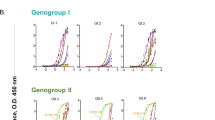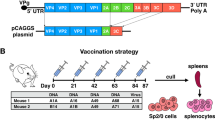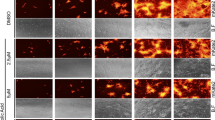Abstract
RHINOVIRUSES belong to the picornavirus family and cause about 50% of common colds1. Most rhinoviruses and some cox-sackie viruses share a common receptor on human cells. The glycoprotein intercellular adhesion molecule-1 (ICAM-1) has recently been identified as the cellular receptor for the subgroup of rhinoviruses known as the major groups2–4. ICAM-1 is a member of the immunoglobulin supergene family and is a ligand for lymphocyte function-associated antigen-1 (LFA-1)5–7; these ICAM-1/LFA-1 interactions are critical to many cell adhesion processes involved in the immunological response8–11. Because anti-ICAM-1 antibodies can block binding of major-group rhinoviruses to cells, we considered that antagonism of virus-receptor interaction might be a way of preventing rhinovirus infection. We have constructed and purified a soluble form of the ICAM-1 molecule, which is normally membrane-bound, and demonstrated that it is a potent and specific inhibitor of rhinovirus infection.
This is a preview of subscription content, access via your institution
Access options
Subscribe to this journal
Receive 51 print issues and online access
$199.00 per year
only $3.90 per issue
Buy this article
- Purchase on Springer Link
- Instant access to full article PDF
Prices may be subject to local taxes which are calculated during checkout
Similar content being viewed by others
References
1. Sperber, S. J. & Hayden, F. G. Antimicrob. Agents Chemother. 32, 409–419 (1988). 2. Greve, J. M. et al. Cell 56, 839–847 (1989). 3. Staunton, D. E. et al. Celi 56, 849–853 (1989). 4. Tomassini, J. E. et al. Proc. natn. Acad. Sci. U.S.A. 86, 4907–4911 (1989). 5. Marlin, S. D. & Springer, T. A. Cell 51, 813–819 (1987). 6. Rothlein, R., Dustin, M. L., Marlin, S. D. & Springer, T. A. J. Immun. 137, 1270–1274 (1986). 7. Staunton, D. E., Marlin, S. D., Stratowa, C., Dustin, M. L. & Springer, T. A. Cell 52, 925–933 (1988). 8. Dustin, M. L., Staunton, D. E. & Springer, T. A. Immun. Today 9, 213–215 (1988). 9. Kishimoto, T. K. et al. Adv. Immun. 46, 149–182 (1989). 10. Wawryk, S. O. et al. Immunol. Rev. 108, 1035–106 (1989). 11. Springer, ¤. "., Dustin, M. L., Kishimoto, T. K. & Marlin, S. D. A. Rev. Immun. 5, 223–252 (1987). 12. Colonno, R. J., Tomassini, J. E. & Callahan, P. L. Positive–strand RNA Viruses (eds Brinton, M. A. & Rueckert, R. R.) 92–102 (Liss, New York, 1987). 13. Rossman, M. G. J. biol. Chem. 264, 14587–14590 (1989). 14. Kunkel, T. A. Proc. natn. Acad. Sci. U.S.A. 82, 488–492 (1985). 15. Peterson, A. & Seed, B. Cell 54, 65–72 (1988). 16. Mulligan, R. C. & Berg, P. Proc. natn. Acad. Sci. U.S.A. 78, 2072–2076 (1981). 17. Mitchell, P. J., Urlaub, G. & Chasin, L. Molec. cell. Biol. 6, 425–440 (1986). 18. Graham, F. L. & van der Eb, A. J. Virology 52, 456–467 (1973). 19. Rothlein, R. et al. J. Immun. 141, 1665–1669 (1988). 20. Abraham, G. & Colonno, R. J. J. Virol. 51, 340–345 (1984).
Author information
Authors and Affiliations
Rights and permissions
About this article
Cite this article
Marlin, S., Staunton, D., Springer, T. et al. A soluble form of intercellular adhesion molecule-1 inhibits rhinovirus infection. Nature 344, 70–72 (1990). https://doi.org/10.1038/344070a0
Received:
Accepted:
Issue Date:
DOI: https://doi.org/10.1038/344070a0
This article is cited by
-
Targeting intercellular adhesion molecule-1 (ICAM-1) to reduce rhinovirus-induced acute exacerbations in chronic respiratory diseases
Inflammopharmacology (2022)
-
Host ICAMs play a role in cell invasion by Mycobacterium tuberculosis and Plasmodium falciparum
Nature Communications (2015)
-
Glycoengineering in plants for the development of N-glycan structures compatible with biopharmaceuticals
Plant Biotechnology Reports (2014)
-
The role of human rhinovirus in immunology, COPD, and corresponding treatments
Frontiers in Biology (2013)
-
Renal allograft rejection: the temporal relationship and predictive value of plasma TNF (alpha and beta), IFN-gamma and soluble ICAM-1
Transplant International (1995)
Comments
By submitting a comment you agree to abide by our Terms and Community Guidelines. If you find something abusive or that does not comply with our terms or guidelines please flag it as inappropriate.



